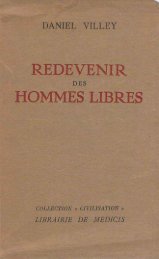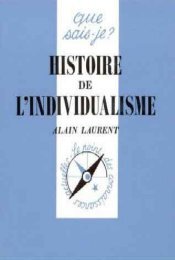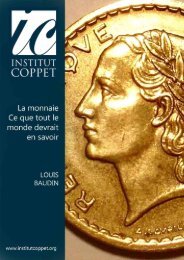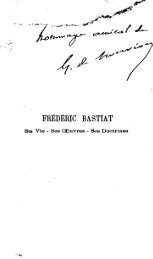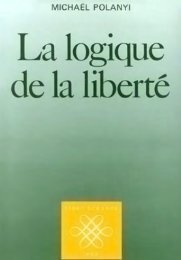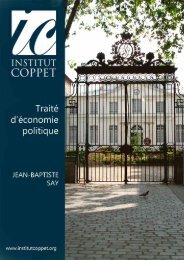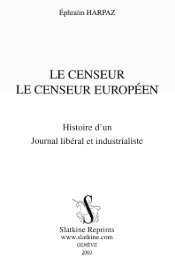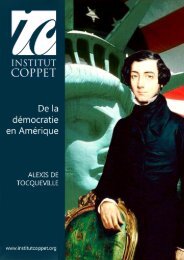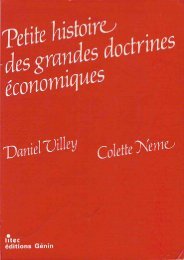- Page 3:
Collection Pluriel fondée par Geor
- Page 6:
Sommaire Introduction. . . . . . .
- Page 11 and 12:
INTRODUCTION Il mistes de Los Angel
- Page 13 and 14:
INTRODUCTION 13 caractère non natu
- Page 15 and 16:
INTRODUCTION 15 qui possède ses pr
- Page 17 and 18:
INTRODUCTION 17 moins à la lettre
- Page 19 and 20:
INTRODUCTION 19 tion de ne pas port
- Page 21:
INTRODUCTION 21 plus en plus import
- Page 24:
24 LA «NOUVELLE ÉCONOMIE» INDUST
- Page 27 and 28:
IMPOSTURES DE L'ÉCONOMIE MIXTE 27
- Page 29 and 30:
IMPOSTURES DE L'ÉCONOMIE MIXTE 29
- Page 31 and 32:
IMPOSTURES DE L'ÉCONOMIE MIXTE 31
- Page 33:
IMPOSTURES DE L'ÉCONOMIE MIXTE 33
- Page 36 and 37:
36 LA «NOUVELLE ÉCONOMIE» INDUST
- Page 38:
38 LA «NOUVELLE ÉCONOMIE» INDUST
- Page 41 and 42: IMPOSTURES DE L'ÉCONOMIE MIXTE 41
- Page 43 and 44: IMPOSTURES DE L'ÉCONOMIE MIXTE 43
- Page 45: IMPOSTURES DE L'ÉCONOMIE MIXTE 45
- Page 49 and 50: Il Il n'y a pas de monopole «natur
- Page 51 and 52: IL N'Y A PAS DE MONOPOLE «NATUREL-
- Page 53 and 54: IL N'V A PAS DE MONOPOLE «NATUREL
- Page 55 and 56: IL N'y A PAS DE MONOPOLE «NATUREL.
- Page 57 and 58: IL N'V A PAS DE MONOPOLE «NATUREL
- Page 59 and 60: IL N'V A PAS DE MONOPOLE. NATUREL»
- Page 61: IL N'y A PAS DE MONOPOLE. NATUREL»
- Page 64: 64 LA «NOUVELLE ÉCONOMIE» INDUST
- Page 67 and 68: IL N'V A PAS DE MONOPOLE «NATUREL
- Page 69 and 70: IL N'Y A PAS DE MONOPOLE «NATUREL
- Page 73: IL N'V A PAS DE MONOPOLE «NATUREL
- Page 79 and 80: IL N'V A PAS DE MONOPOLE «NATUREL.
- Page 81 and 82: IL N'V A PAS DE MONOPOLE «NATUREL,
- Page 83 and 84: IL N'Y A PAS DE MONOPOLE «NATUREL
- Page 85 and 86: IL N'V A PAS DE MONOPOLE «NATUREL
- Page 88 and 89: 88 LA «NOUVELLE ÉCONOMIE» INDUST
- Page 92: 92 LA «NOUVELLE ÉCONOMIE» INDUST
- Page 95 and 96: III La véritable histoire des « s
- Page 97 and 98: HISTOIRE DES «SERVICES PUBLICS. 97
- Page 99: HISTOIRE DES «SERVICES PUBLICS» 9
- Page 102 and 103: 102 LA« NOUVELLE ÉCONOMIE» INDUS
- Page 104 and 105: 104 LA« NOUVELLE ÉCONOMIE» INDUS
- Page 106: 106 LA« NOUVELLE ÉCONOMIE» INDUS
- Page 109: HISTOIRE DES «SERVICES PUBLICS» 1
- Page 113: HISTOIRE DES «SERVICES PUBLICS. 11
- Page 116 and 117: 116 LA« NOUVELLE ÉCONOMIE. INDUST
- Page 118 and 119: Ils LA« NOUVELLE ÉCONOMIE» INDUS
- Page 120 and 121: 120 LA« NOUVELLE ÉCONOMIE» INDUS
- Page 122 and 123: 122 LA« NOUVELLE ÉCONOMIE» INDUS
- Page 124 and 125: 124 LA« NOUVELLE ÉCONOMIE» INDUS
- Page 126 and 127: 126 LA. NOUVELLE ÉCONOMIE. INDUSTR
- Page 128 and 129: 128 LA. NOUVELLE ÉCONOMIE» INDUST
- Page 130 and 131: 130 LA. NOUVELLE ÉCONOMIE» INDUST
- Page 133: POURQUOI PRIVATISER LES ONDES 133 l
- Page 136 and 137: 136 LA« NOUVELLE ÉCONOMIE» INDUS
- Page 138 and 139: 138 LA« NOUVELLE ÉCONOMIE. INDUST
- Page 140 and 141:
140 LA« NOUVELLE ÉCONOMIE» INDUS
- Page 144 and 145:
144 LA« NOUVELLE ÉCONOMIE» INDUS
- Page 146:
146 LA. NOUVELLE ÉCONOMIE» INDUST
- Page 149 and 150:
LE MYTHE DE LA «CONCENTRATION» 14
- Page 151 and 152:
LE MYTHE DE LA • CONCENTRATION»
- Page 153 and 154:
LE MYTHE DE LA «CONCENTRATION» 15
- Page 155:
LE MYTHE DE LA «CONCENTRATION» 15
- Page 158 and 159:
158 LA« NOUVELLE ÉCONOMIE» INDUS
- Page 160 and 161:
160 LA« NOUVELLE ÉCONOMIE» INDUS
- Page 162 and 163:
162 LA« NOUVELLE ÉCONOMIE» INDUS
- Page 164 and 165:
164 LA« NOUVELLE ÉCONOMIE» INDUS
- Page 166 and 167:
166 LA. NOUVELLE ÉCONOMIE. INDUSTR
- Page 168 and 169:
168 LA« NOUVELLE ÉCONOMIE» INDUS
- Page 170 and 171:
170 LA« NOUVELLE ÉCONOMIE» INDUS
- Page 172 and 173:
172 LA« NOUVELLE ÉCONOMIE» INDUS
- Page 174:
174 LA« NOUVELLE ÉCONOMIE. INDUST
- Page 178 and 179:
178 LA« NOUVELLE ÉCONOMIE - INDUS
- Page 180 and 181:
180 LA« NOUVELLE ÉCONOMIE» INDUS
- Page 182 and 183:
182 LA« NOUVELLE ÉCONOMIE» INDUS
- Page 184 and 185:
184 LA« NOUVELLE ÉCONOMIE. INDUST
- Page 186 and 187:
186 LA« NOUVELLE ÉCONOMIE» INDUS
- Page 188 and 189:
188 LA« NOUVELLE ÉCONOMIE» INDUS
- Page 190 and 191:
190 LA« NOUVELLE ÉCONOMIE» INDUS
- Page 192 and 193:
192 LA. NOUVELLE ÉCONOMIE» INDUST
- Page 194 and 195:
194 LA« NOUVELLE ÉCONOMIE» INDUS
- Page 196 and 197:
196 LA. NOUVELLE ÉCONOMIE» INDUST
- Page 198 and 199:
198 LA« NOUVELLE ÉCONOMIE» INDUS
- Page 201 and 202:
LES GRANDES ENTREPRISES... 201 de r
- Page 203 and 204:
LES GRANDES ENTREPRISES... 203 tion
- Page 205 and 206:
LES GRANDES ENTREPRISES... 205 Depu
- Page 207 and 208:
LES GRANDES ENTREPRISES... 207 les
- Page 209 and 210:
LES GRANDES ENTREPRISES... 209 « C
- Page 211 and 212:
LES GRANDES ENTREPRISES... 211 Une
- Page 213 and 214:
LES GRANDES ENTREPRISES... 213 taux
- Page 215 and 216:
LES GRANDES ENTREPRISES... 215 nomb
- Page 218 and 219:
218 LA« NOUVELLE ÉCONOMIE» INDUS
- Page 220 and 221:
220 LA« NOUVELLE ÉCONOMIE» INDUS
- Page 222 and 223:
222 LA« NOUVELLE ÉCONOMIE» INDUS
- Page 225:
LES GRANDES ENTREPRISES ... 225 mie
- Page 228 and 229:
228 LA« NOUVELLE ÉCONOMIE - INDUS
- Page 231:
VII Un autre regard sur les choix d
- Page 235 and 236:
LA THÉORIE ÉCONOMIQUE DES CONTRAT
- Page 237 and 238:
LA THÉORIE ÉCONOMIQUE DES CONTRAT
- Page 239 and 240:
LA THÉORIE ÉCONOMIQUE DES CONTRAT
- Page 241 and 242:
LA THÉORIE ÉCONOMIQUE DES CONTRAT
- Page 243 and 244:
LA THÉORIE ÉCONOMIQUE DES CONTRAT
- Page 245 and 246:
LA THÉORIE ÉCONOMIQUE DES CONTRAT
- Page 247 and 248:
LA THÉORIE ÉCONOMIQUE DES CONTRAT
- Page 249 and 250:
LA THÉORIE ÉCONOMIQUE DES CONTRAT
- Page 251 and 252:
LA THÉORIE ÉCONOMIQUE DES CONTRAT
- Page 253 and 254:
LA THÉORIE ÉCONOMIQUE DES CONTRAT
- Page 255 and 256:
LA THÉORIE ÉCONOMIQUE DES CONTRAT
- Page 257 and 258:
LA THÉORIE ÉCONOMIQUE DES CONTRAT
- Page 259 and 260:
LA THÉORIE ÉCONOMIQUE DES CONTRAT
- Page 261 and 262:
LA THÉORIE ÉCONOMIQUE DES CONTRAT
- Page 263 and 264:
LA THÉORIE ÉCONOMIQUE DES CONTRAT
- Page 265 and 266:
LA THÉORIE ÉCONOMIQUE DES CONTRAT
- Page 267 and 268:
LA THÉORIE ÉCONOMIQUE DES CONTRAT
- Page 269 and 270:
LA THÉORIE ÉCONOMIQUE DES CONTRAT
- Page 271 and 272:
LA THÉORIE ÉCONOMIQUE DES CONTRAT
- Page 273 and 274:
LA THÉORIE ÉCONOMIQUE DES CONTRAT
- Page 275 and 276:
LA THÉORIE ÉCONOMIQUE DES CONTRAT
- Page 277 and 278:
LA THÉORIE ÉCONOMIQUE DES CONTRAT
- Page 279 and 280:
LA THÉORIE ÉCONOMIQUE DES CONTRAT
- Page 281 and 282:
VIII Plaidoyer pour un mire-échang
- Page 283 and 284:
PLAIDOYER POUR UN LIBRE-ÉCHANGE 28
- Page 285 and 286:
PLAIDOYER POUR UN LIBRE-ÉCHANGE 28
- Page 287 and 288:
PLAIDOYER POUR UN LIBRE-ÉCHANGE 28
- Page 289 and 290:
PLAIDOYER POUR UN LIBRE-ÉCHANGE 28
- Page 292:
292 LA« NOUVELLE ÉCONOMIE» INDUS
- Page 297 and 298:
PLAIDOYER POUR UN LIBRE-ÉCHANGE 29
- Page 299 and 300:
PLAIDOYER POUR UN LIBRE-ÉCHANGE 29
- Page 301 and 302:
PLAIDOYER POUR UN LIBRE-ÉCHANGE 30
- Page 303 and 304:
PLAIDOYER POUR UN LIBRE-ÉCHANGE 30
- Page 305 and 306:
PLAIDOYER POUR UN LIBRE-ÉCHANGE 30
- Page 307 and 308:
PLAIDOYER POUR UN LIBRE-ÉCHANGE 30
- Page 309 and 310:
PLAIDOYER POUR UN LIBRE-ÉCHANGE 30
- Page 311 and 312:
PLAIDOYER POUR UN LIBRE-ÉCHANGE 31
- Page 313 and 314:
PLAIDOYER POUR UN LIBRE-ÉCHANGE 31
- Page 315:
PLAIDOYER POUR UN LIBRE-ÉCHANGE 31
- Page 318 and 319:
318 LA« NOUVELLE ÉCONOMIE» INDUS
- Page 320 and 321:
320 LA« NOUVELLE ÉCONOMIE» INDUS
- Page 323 and 324:
IX Pour une approche libérale de l
- Page 325 and 326:
APPROCHE LIBÉRALE DE L'ENVIRONNEME
- Page 327 and 328:
APPROCHE LIBÉRALE DE L'ENVIRONNEME
- Page 331 and 332:
APPROCHE LIBÉRALE DE L'ENVIRONNEME
- Page 333 and 334:
APPROCHE LIBÉRALE DE L'ENVIRONNEME
- Page 335 and 336:
APPROCHE LIBÉRALE DE L'ENVIRONNEME
- Page 337 and 338:
APPROCHE LIBÉRALE DE L'ENVIRONNEME
- Page 339 and 340:
APPROCHE LIBÉRALE DE L'ENVIRONNEME
- Page 341 and 342:
APPROCHE LIBÉRALE DE L'ENVIRONNEME
- Page 343 and 344:
APPROCHE LIBÉRALE DE L'ENVIRONNEME
- Page 345 and 346:
APPROCHE LIBÉRALE DE L'ENVIRONNEME
- Page 347:
APPROCHE LIBÉRALE DE L'ENVIRONNEME
- Page 351 and 352:
PROPRIÉTÉ INDUSTRIELLE ... 351 co
- Page 353 and 354:
PROPRIÉTÉ INDUSTRIELLE ... 353 li
- Page 355 and 356:
PROPRIÉTÉ INDUSTRIELLE ... 355 si
- Page 357 and 358:
PROPRIÉTÉ INDUSTRIELLE ... 357 al
- Page 359:
PROPRIÉTÉ INDUSTRIELLE ... 359 ta
- Page 366:
366 LA« NOUVELLE ÉCONOMIE» INDUS
- Page 369 and 370:
PROPRIÉTÉ INDUSTRIELLE ... 369 gn
- Page 371 and 372:
PROPRIÉTÉ INDUSTRIELLE ... 371 me
- Page 374:
374 LA« NOUVELLE ÉCONOMIE. INDUST
- Page 381:
PROPRIÉTÉ INDUSTRIELLE ... 381 el
- Page 385:
1 L'erreur scientiste de Léontieff
- Page 388:
388 LA« NOUVELLE ÉCONOMIE» INDUS
- Page 394 and 395:
394 LA« NOUVELLE ÉCONOMIE» INDUS
- Page 396 and 397:
2 Politiques industrielles: les mau
- Page 402:
402 LA« NOUVELLE ÉCONOMIE» INDUS
- Page 407:
ANNEXES 407 tration élevé permet
- Page 415 and 416:
ANNEXES 415 politiques antitrust on
- Page 419:
ANNEXES 419 clair que le principe d
- Page 423 and 424:
ANNEXES 423 ment déjà évoqué: p
- Page 426 and 427:
426 LA« NOUVELLE ÉCONOMIE» INDUS
- Page 428 and 429:
428 LA« NOUVELLE ÉCONOMIE» INDUS
- Page 430:
430 LA« NOUVELLE ÉCONOMIE" INDUST
- Page 433:
ANNEXES 433 administration, même s
- Page 439:
ANNEXES 439 contraintes. Plus il es



